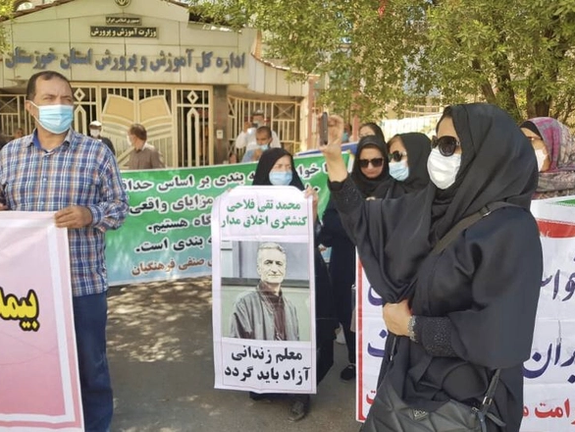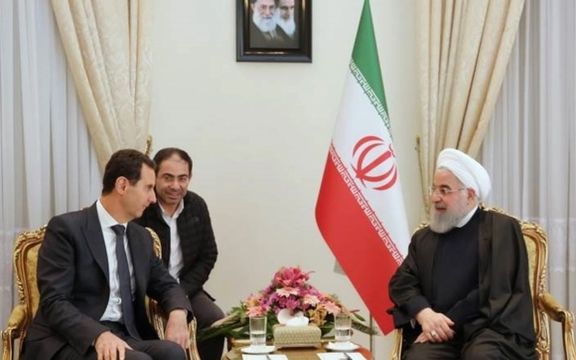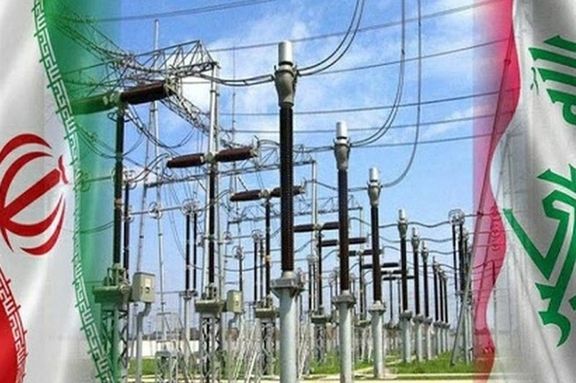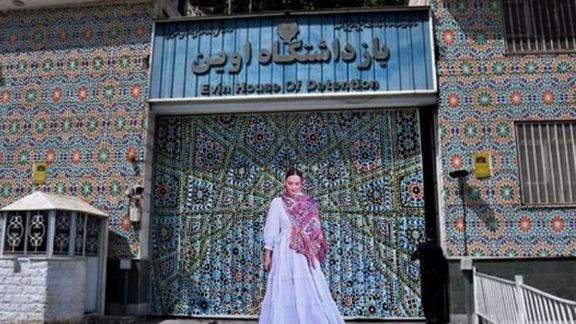US To Hold Iran Accountable For Rights Violations, Spokesman Says

The US State Department has applauded a statement by UN experts on Iran's human rights violations, and said their concerns are "certainly the concern of ours."

The US State Department has applauded a statement by UN experts on Iran's human rights violations, and said their concerns are "certainly the concern of ours."
Iran International asked State Department spokesperson, Ned Price, during his press briefing on Thursday about the reaction of the United States to the UN experts’ concerns about violations by Iran.
"This is why we condemned the use of violence against these peaceful protesters. We made the point that we support the right of these protesters to peacefully exercise their fundamental freedoms," Price responded.
A group of UN human rights experts expressed serious concerns about the violent crackdown against civil society in Iran, especially against members of workers’ unions and teachers on June 15.
"We will continue to hold Iran accountable for human rights abuses that take place inside of Iran and every strain of nefarious activity that it undertakes," Price added when asked if the Biden administration's hope for returning to JCPOA would prevent it from imposing human rights sanctions on Iran.
After year-long negotiations to restore the 2015 nuclear agreement failed to reach a successful conclusion, the US imposed fresh sanctions Thursday on several companies and individuals accused of violating current sanctions on Iran’s oil industry.

While anti-government protests and strikes by merchants continues in Iran, teachers held a nationwide protest against their low salaries and systematic discrimination.
The teachers held a gathering in Karaj, near the capital Tehran on Thursday and chanted slogans against the government, and called for the release of their colleagues arrested in previous rounds of protests.
More than 20 people were reportedly arrested on the eve of the protests in Kurdish majority provinces in western Iran.
In Tehran, sporadic protest rallies were reported but security forces and special units were present in front of the parliament building in large numbers to prevent the demonstrations.
The situation was the same in Mashhad in northeastern Iran, where security forces cordoned off the areas where a gathering were planned.
Numerous pictures of teachers' gatherings in the cities of Sari, Zanjan, Shahrekord, Ardabil, Khorramabad, Malayer, Marivan, Sanandaj, Kermanshah, Andimeshk, Hamedan, Kashmar, and Bandar Abbas have been published in social media.
Teachers have been holding frequent protests for nearly a year, but the political situation in Iran has worsened in recent months, with rising food prices and a growing perception of government inefficiency and corruption.
Four years of deep economic crisis in Iran following the introduction of United States ‘maximum pressure’ sanctions in 2018 has led to a sharp increase in living costs and labor unrest.
People from different walks of life, including nurses, firefighters, and even judiciary department employees and prison guards, have held protest rallies or strikes to demand higher salaries.

The US government has offered $10 million for information on Hezbollah financier Muhammad Ja'far Qasir who helps fund Hezbollah's terrorist activities by selling Iranian oil.
The government’s Rewards for Justice program announced the award on Wednesday, saying he is involved in smuggling and other criminal operations to support the Iran-backed Lebanese group.
“Qasir is also a critical conduit for financial disbursements from Iran’s Islamic Revolutionary Guard Corps-Qods Force (IRGC-QF) that are used to fund Hezbollah's activities," the statement said.
According to the US government, he also helps oversee several front companies used to mask the IRGC-QF’s role in the sale of oil and other extractives, a crucial source of income for Hezbollah, the Quds (Quds) force, the regime of Syrian President Bashar al-Assad, and other illicit actors.
“In addition, Qasir leads Hezbollah’s Unit 108, which coordinates closely with the IRGC-QF to facilitate the transfer of weapons, technology, and other support from Syria to Lebanon,” the statement said.
Earlier in the week, the US government’s Rewards for Justice program offered up to $15 million for information that can disrupt Iran’s IRGC and its Quds Force financial networks. The Quds Force is a branch of the IRGC that conducts operations beyond Iran’s borders.
The announcement can be seen as additional pressure on the Islamic Republic as it continues to support militant groups across the Middle East and beyond, after negotiations to revive the 2015 nuclear agreement known as the JCPOA came to a halt in March.

The Iraqi Electricity Ministry has begun paying off its debts for gas imports from Iran that were hindered due to the US sanctions on the Islamic Republic since.
Iranian Petroleum Minister Javad Oji said on Wednesday that the country received $1.6 billion of the debts after a spokesman for Iraqi Electricity Ministry, Ahmed Moussa, told the Iraqi News Agency (INA) on Tuesday that Baghdad would pay the debt within two days.
The Iraqi spokesman issued a statement stressing the necessity to pay the Iranian gas debts overdue since 2020 to prevent a decrease in the quantities of gas flow to the country.
He also thanked Prime Minister Mustafa Al-Kadhimi for his care, direct supervision, and the role of the parliament, which understands the country’s dire need of electricity.
US banking sanctions imposed on Iran hindered payments by Iraq although Iran on many occasions announced receipt of payments.
Last Wednesday, the Iraqi parliament passed an emergency finance bill for "food security and development" -- totaling 25 trillion Iraqi dinars, approximately over $17 billion -- to pay debts to Iran to ensure gas supplies and stop worsening power cuts. Of that, $2.6 billion will be allocated to settling Iraq's gas and electricity debts, as well as for buying further energy supplies from abroad.
Despite its immense oil and gas reserves, Iraq remains dependent on imports to meet energy needs, especially from neighboring Iran, which currently provides a third of Iraq's gas and electricity needs.
Iran had demanded Iraq pay $1.6 billion it owes for gas imports by the start of June to guarantee further supplies, as it is cutting or reducing supplies regularly due to its own shortages.

A mass wedding ceremony at a military academy of Iranian Army’s Ground Forces has led to a barrage of criticism over the use of a red Ford Mustang festooned with flowers as the wedding car.
The photos of the collective weeding of at least 100 couples at Imam Ali Officers' University went viral on Wednesday by Iranian social media users who were shocked that the cadets who chant “Death to America” during their trainings daily are tying the knot in one of the most iconic American cars.
While many are irked by the hypocrisy, most people have made fun of the combination of a red Ford Mustang with a white chador, an outer garment or open cloak worn by Muslim women.
While Iranian authorities, especially military officials, never lose a chance to criticize the use of American brands, many of them and their family members pay large amounts of money to use the sumptuous products.
Earlier in the year, a selfie of Qasem Soleimani’s daughter holding the latest iPhone 13 was picked up by Iranian social media users who began reposting it to make the point that the phone the daughter of the former Qods (Quds) force commander uses to demand retribution for the United States, is an iPhone.
Collective weddings, which appeared in Iran in the 1990s, are promoted by the authorities to encourage marriage among young people, who hesitate mainly over the sheer costs of holding a wedding ceremony. Their costs are usually covered by various government institutions, with the office of the Supreme Leader’s representative for universities as one of the main funders.

Many have accused a female social media influencer who visited Iran in a 'fam trip' of distorting reality in the Islamic Republic in an "arranged visit".
‘Fam trip’ (familiarization trip) is nothing new in Iran. For years the Islamic Republic has been using foreign reporters in Iran and sometimes arranged visits by famous travel documentary filmmakers to create a "beautified" image of the Islamic Republic for viewers in other countries.
The intent is averting often self-inflicted propaganda that portrayed the Islamic Republic as a country where the government had no respect for human rights and people including children watched executions in the streets, government officers cut off criminals’ limbs in public and chastity police harassed and battered women whose headscarf and dress was considered to be indecent.
During the past week, almost the entire Persian social media turned against Hoda Rostami, a young woman living abroad, and a social media influencer, who took a ‘fam trip’ to Iran and published her own or other female tourists' images next to mosques, ancient relics and even the notorious Evin prison on social media, particularly on her Instagram page, which has some 46,000 followers.
According to Rouydad24 news website in Iran, Rostami beautifies all ugly things on this page and her images of women in the Iranian society, with attire that would otherwise illicit a tough response from the police. Her presentation of supposed freedoms is inconsistent with the reality on the ground. The website added that the Iranian police will stop anyone else doing the same in those places. The website also questioned how she and other women in her photos can be in public without any objection by the police.
Social media users accused Rostami of "normalizing misery," while some even said that what she was doing was "blood washing" meaning that she was washing the blood off the hands of the Islamic Republic, when security forces have killed hundreds of protesters in recent years who were demanding freedoms she portrays as existing in Iran. In many of those images Rostami and her "guests" are seen in public with no hijab, although ordinary people will be arrested on the spot.
She also revealed after being criticized by netizens that she had meetings with state officials at ministerial level to facilitate the fam trips.
Last week, investigative reporters on social media found out that Hoda Rostami, now reportedly a citizen of Sweden, was in fact born in Iraq and that her father is a senior figure in Hashd al-Sha'bi, an Iranian proxy militia group in Iraq.
Some on social media said that lived in Iran for several years adecade ago, learned Persian and run tours for foreigneres. Apparently her original Iraqi name is Hoda Jabbar Karim.
Many have pointed out that her pictures showing Iranian women at the seaside are flat and fabricated lies. Rouydad24 reminded that two mosques and ancient sites were shut down in Shiraz two years ago only because some tourists were not wearing the kind of dress consistent with compulsory hijab rules. The website also reminded that in some mosques visitors are even not allowed to have their cameras with them.
Recently, the Russian ambassador to Tehran said that what stopped Russian tourists from visiting Iran was compulsory hijab and the fact that drinking alcohol is prohibited in Iran.
Hoda Rostami previously objected to similar comments when they were meant to prove her wrong, but she has been silent after her Iraqi identity and her links with some Iranian state officials have been disclosed.
A social media user wrote that she was arrested in Iran's Qeshm Island because she was there in the same kind of outfit used by Rostami. She wrote: "Iran is much different from what Hoda portrays."